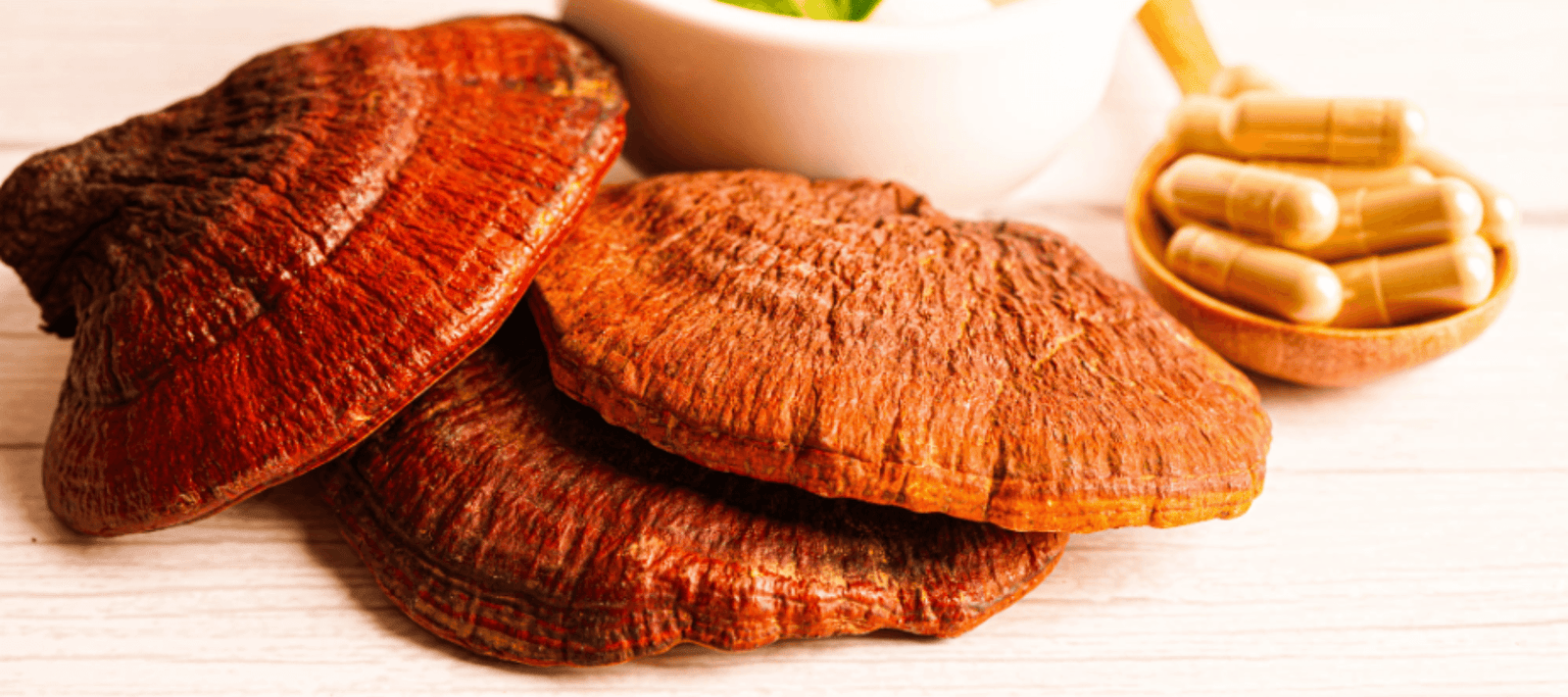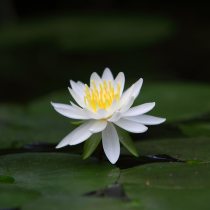Your Cart is Empty
SUBSCRIPTION BOXES ARE SOLD OUT
SUBSCRIPTION BOXES ARE SOLD OUT
Shop
Learn

Reishi Mushroom: A Natural Treasure for Holistic Wellness
July 28, 2023
What is Reishi Mushroom?
For thousands of years, the Reishi mushroom, known as Ganoderma lucidum, has been revered in traditional medicine and ancient cultures worldwide. Also known as the Mushroom of Immortality and Lingzhi, this medicinal fungus has captured the hearts of healers and wellness enthusiasts. Reishi mushroom is native to Europe, Asia, and North America and prefers tropical, subtropical, and temperate climates with plenty of deciduous hardwoods such as oak and maple. This fungus is rare in the wild and has been cultivated due to the high demand for this mushroom. Only two or three out of 10,000 mature hardwood trees have Reishi growing on them, with oak and maple being the most common. The Reishi mushroom is a large, dark mushroom with a glossy exterior and a woody texture. Reishi mushrooms are edible but have a bitter taste and tough texture and contain dietary fiber and various minerals, vitamins, and amino acids.
Summary: The Reishi mushroom, also known as Ganoderma lucidum, holds a rich history in traditional medicine and is revered for its medicinal properties. In rare instances in the wild, Reishi prefers hardwood trees like oak and maple and has been cultivated due to its high demand for its numerous health benefits and nutritional content.
History of Reishi Mushroom
The history of Reishi dates back to over 2,000 years ago in ancient China, where it was first documented in the Chinese pharmacopeia. This precious mushroom was believed to promote longevity, provide spiritual enlightenment, and enhance overall vitality, and it was primarily reserved for emperors and the royal elite. Ancient practitioners harnessed the power of Reishi in herbal remedies, tonics, and teas, attributing it to a wide array of health benefits. In addition to its medicinal properties, Reishi was also considered a symbol of good fortune, happiness, and immortality. In Chinese culture, art and sculptures often depict it as a sacred and auspicious symbol. Reishi was also associated with Qi, or life force energy, making it a treasured talisman for spiritual practices and rituals. With the advancement of science and technology, Reishi caught the attention of researchers and scientists in the 20th century. They were intrigued by the mushroom's unique bioactive compounds, including triterpenes, polysaccharides, and antioxidants.

Summary: Reishi mushroom has a rich history dating back over 2,000 years in ancient China, where it was prized for its medicinal properties and reserved for emperors and the elite. In addition to its health benefits, Reishi was considered a symbol of good fortune and immortality, and it later caught the attention of researchers for its unique bioactive compounds.
How to Use Reishi Mushroom
Reishi mushroom is generally incorporated into herbal supplements, tinctures, or teas and offers a holistic approach to enhancing vitality, promoting longevity, and restoring balance in both the mind and body. Unlike some foods or supplements, the dose of Reishi mushroom can vary depending on which type is used. Commonly, a dried extract of the mushroom is used. Some supplements use only certain portions of the extract. The recommended doses may be much lower than the values reported. The right dosage of Reishi mushroom extract or powder can vary widely depending on which form of mushroom a person uses. It is essential to check the label of the specific product for the recommended dosage. Before taking a reishi mushroom supplement, a person should talk to a doctor. Supplements can interact with other medications, potentially causing adverse effects and worsen some health conditions.
Summary: Reishi mushroom is commonly found in herbal supplements, tinctures, and teas, offering a holistic approach to promoting vitality and restoring balance in the body and mind. However, the dosage of Reishi can vary depending on the type used, so it's crucial to check the product label and consult with a doctor before taking the supplement to avoid potential interactions with medications and health conditions.

Benefits of Reishi Mushroom
Reishi's reputation as an adaptogenic wonder continues to thrive as scientific studies uncover many health benefits. Some of the notable benefits of Reishi include:
Immune System Support
Reishi boosts the immune system, helping the body defend against infections and illnesses more effectively. Numerous studies have highlighted Reishi's immunomodulatory properties, which may enhance the body's natural defenses against infections and diseases. Reishi’s bioactive compounds, such as polysaccharides and triterpenes, stimulate the immune system, empowering your body to avoid infections and illnesses more effectively. One study found that Reishi could increase the number of other white blood cells in colorectal cancer patients. In another study, the fungus improved the function of lymphocytes, which help fight infections and cancer, in athletes exposed to stressful conditions. With its immunomodulating effects, the Reishi mushroom can help support hormonal balance and help regulate the immune system.
Stress Reduction and Relaxation
As an adaptogen, Reishi helps the body adapt to stress and maintain balance, promoting calm and mental well-being, improving sleep quality, and combating insomnia. Though Reishi’s effects on the immune system are often most emphasized, it may also reduce depression and fatigue. One study examined its impact on 132 people with neurasthenia, a condition associated with aches, pains, dizziness, headaches, and irritability. The researchers found that fatigue was reduced and well-being was improved after eight weeks of taking the supplements. Another study on people with breast cancer found that Reishi powder reduced fatigue, anxiety, and depression and improved quality of life after four weeks.

Anti-Inflammatory Properties
Reishi's bioactive compounds have shown promising anti-inflammatory effects, making it potentially beneficial for inflammatory conditions like arthritis. Inflammation lies at the root of various health issues, from joint discomfort to chronic diseases. Due to its triterpenes and polysaccharides, Reishi's anti-inflammatory action makes it a valuable ally in combatting inflammation and promoting overall well-being.
Cardiovascular Health
Studies indicate that Reishi may support heart health by promoting healthy blood pressure and cholesterol levels. Several studies looking at people with healthy and unhealthy blood sugar levels and lipids found that Reishi mushrooms may help decrease blood sugar, increase HDL (good) cholesterol, and reduce triglycerides. Meanwhile, some studies also suggest that certain compounds found in the Reishi mushroom could decrease blood sugar.
Potential Anti-Tumor Effects
Reishi's therapeutic potential extends to cancer research. Some studies have shown that Reishi may inhibit the growth of specific cancer cells, making it a promising candidate for cancer therapy and prevention. Many people consume Reishi due to its potential anticancer properties. Several studies have shown that it can lead to the death of cancer cells. One review indicated that the mushroom could benefit people with cancer when used alongside traditional treatment by increasing the activity of white blood cells and improving quality of life.

Summary: Reishi mushroom, known for its adaptogenic properties, offers numerous health benefits, including immune system support, stress reduction, and relaxation. Its bioactive compounds, such as polysaccharides and triterpenes, stimulate the immune system, combat inflammation, and promote cardiovascular health.
Risks and Side Effects of Reishi Mushroom
Despite its popularity, some have questioned the safety of Reishi mushrooms. Many side effects of Reishi mushrooms remain unknown due to the limited body of research in humans. A few people reported side effects, such as upset stomach, skin rashes, and liver damage. Still, because other factors were involved, it can be challenging to determine if the mushroom itself was responsible for the observed liver damage. Other potential side effects could include nausea, insomnia, chronic diarrhea, liver toxicity, dryness in the mouth, throat, and nose, itchiness, nosebleeds, and bloody stool. Nevertheless, several groups of people should probably avoid Reishi, including:
- Individuals scheduled for surgery or with bleeding disorders: Reishi supplements may cause anticoagulants or antiplatelets to become more effective, which increases the risk of bleeding.
- Individuals with low blood pressure or are taking blood pressure medication: Reishi supplements might lower blood pressure.
- Individuals taking immunosuppressants: Reishi mushroom supplements may counteract their effectiveness.
- Women who are pregnant or breastfeeding should not consume these mushrooms.

Summary: While Reishi mushrooms are popular for their health benefits, safety concerns arise due to limited human research, with reported side effects like upset stomach, skin rashes, and liver damage. Certain groups, such as those with bleeding disorders, low blood pressure, taking blood pressure medication or immunosuppressants, and pregnant or breastfeeding women, should exercise caution or avoid reishi mushroom supplements.
Now Try Reishi Mushroom
From ancient emperors seeking immortality to modern-day health enthusiasts, Reishi continues to be a treasured ally in the pursuit of vitality and harmony. As scientific interest in Reishi grows, we can expect to unravel even more of its mystical secrets and continue to embrace the sacred healing gift bestowed upon us by nature's miraculous Mushroom of Immortality. Reishi mushroom shines as a true powerhouse of holistic wellness. With its versatility and extensive potential uses, this ancient medicinal treasure inspires awe in the natural health field. You can harness Reishi's impressive range of health by incorporating Reishi into your daily routine through supplements, teas, or tinctures.

Sources
Ahmad M. F. (2020).Ganoderma lucidum: A rational pharmacological approach to surmount cancer. Journal of ethnopharmacology, 260, 113047.
Chen, X., Hu, Z. P., Yang, X. X., Huang, M., Gao, Y., Tang, W., Chan, S. Y., Dai, X., Ye, J., Ho, P. C., Duan, W., Yang, H. Y., Zhu, Y. Z., & Zhou, S. F. (2006).Monitoring of immune responses to a herbal immuno-modulator in patients with advanced colorectal cancer. International immunopharmacology, 6(3), 499–508.
El Sheikha A. F. (2022). Nutritional Profile and Health Benefits of Ganoderma lucidum "Lingzhi, Reishi, or Mannentake" as Functional Foods: Current Scenario and Future Perspectives. Foods (Basel, Switzerland), 11(7), 1030.
Guggenheim, A. G., Wright, K. M., & Zwickey, H. L. (2014). Immune Modulation From Five Major Mushrooms: Application to Integrative Oncology. Integrative medicine (Encinitas, Calif.), 13(1), 32–44.
Jin, H., Song, C., Zhao, Z., & Zhou, G. (2020).Ganoderma Lucidum Polysaccharide, an Extract from Ganoderma Lucidum, Exerts Suppressive Effect on Cervical Cancer Cell Malignancy through Mitigating Epithelial-Mesenchymal and JAK/STAT5 Signaling Pathway. Pharmacology, 105(7-8), 461–470.
Jin, X., Ruiz Beguerie, J., Sze, D. M., & Chan, G. C. (2016).Ganoderma lucidum (Reishi mushroom) for cancer treatment. The Cochrane database of systematic reviews, 4(4), CD007731.
Kim Y. R. (2005).Immunomodulatory Activity of the Water Extract from Medicinal Mushroom Inonotus obliquus. Mycobiology, 33(3), 158–162.
Liu, Q., & Tie, L. (2019).Preventive and Therapeutic Effect of Ganoderma (Lingzhi) on Diabetes. Advances in experimental medicine and biology, 1182, 201–215.
Najafi, M., Soleimani, A. A., Ahmadi, K., Javidi, N., & Kamkar, E. H. (2015).The Effectiveness of Emotionally Focused Therapy on Enhancing Marital Adjustment and Quality of Life among Infertile Couples with Marital Conflicts. International journal of fertility & sterility, 9(2), 238–246.
Tang, W., Gao, Y., Chen, G., Gao, H., Dai, X., Ye, J., Chan, E., Huang, M., & Zhou, S. (2005).A randomized, double-blind and placebo-controlled study of a Ganoderma lucidum polysaccharide extract in neurasthenia. Journal of medicinal food, 8(1), 53–58.
Wanmuang, H., Leopairut, J., Kositchaiwat, C., Wananukul, W., & Bunyaratvej, S. (2007).Fatal fulminant hepatitis associated with Ganoderma lucidum (Lingzhi) mushroom powder. Journal of the Medical Association of Thailand = Chotmaihet thangphaet, 90(1), 179–181.
Zhang, Y., Lin, Z., Hu, Y., & Wang, F. (2008).Effect of Ganoderma lucidum capsules on T lymphocyte subsets in football players on "living high-training low". British journal of sports medicine, 42(10), 819–822.
Zhao, H., Zhang, Q., Zhao, L., Huang, X., Wang, J., & Kang, X. (2012).Spore Powder of Ganoderma lucidum Improves Cancer-Related Fatigue in Breast Cancer Patients Undergoing Endocrine Therapy: A Pilot Clinical Trial. Evidence-based complementary and alternative medicine : eCAM, 2012, 809614.
Subscribe
Sign up to get the latest on sales, new releases and more …


